
Dean’s Quarterly
Celebrating our 50th anniversary as a national and international leader in biomedical education, research, and patient care
Dean’s Quarterly
The Dean's Quarterly features the latest news and research from Icahn School of Medicine at Mount Sinai.
This report highlights:
- A Message from the Dean: Celebrating the 50th anniversary of the Icahn School of Medicine at Mount Sinai
- Five recruits revitalize psychosis research and treatment
- A new grant supports clinical trials in immunotherapy
- Research shows cancer metastasis may occur before a tumor develops
- A possible link between Crohn’s and Parkinson’s diseases
- A Mount Sinai spin-off to revolutionize diagnostics
- A study that reveals a direct link between surgeon experience and outcomes for mitral valve operations
- Nature publication names Mount Sinai among the most innovative in research
- Faculty appointments
- Relief missions to Puerto Rico
Message from the Dean
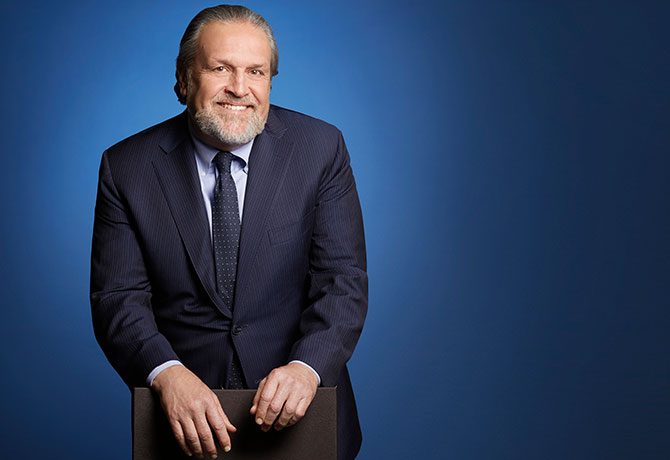
This year, we celebrate the 50th anniversary of the Icahn School of Medicine at Mount Sinai and our many contributions to human health. When our founders chose to open a medical school that was built upon the distinguished research and clinical foundations of The Mount Sinai Hospital, they chose a path that favored agility. That decision has served us well. Our entrepreneurial spirit and emphasis on innovation have enabled us to accelerate the pace of discovery and contribute to significant medical and scientific advances.
Today, we are part of one of the largest health systems in the New York metropolitan area. In 2018, we ranked No. 18 among the top U.S. medical schools for research, according to U.S. News & World Report. In rankings created by the Nature Index 2017 Innovation supplement, we were among the top 10 research institutions in the world based on our contributions to published research that is later cited by other organizations in patent development.
Mount Sinai’s commitment to innovation extends to all facets of our health system. We offer programs that help future clinicians understand their unconscious bias. Our Donald and Vera Blinken FlexMed Program—the first of its kind—allows college sophomores in any major to apply for early assurance of acceptance to our medical school.
We have been pioneers in health care delivery. Recently, we launched Mount Sinai at Home, which includes programs that care for patients in their homes and a research component. Mount Sinai at Home has created a payment model for home health care, the first to be approved by Medicare’s Physician-Focused Payment Model Technical Advisory Committee.
Mount Sinai’s commitment to embracing change and providing our faculty with the freedom to choose the path less traveled is as strong as ever, and highlighted in the articles that follow.
Five Recruits Revitalize Psychosis Research and Treatment
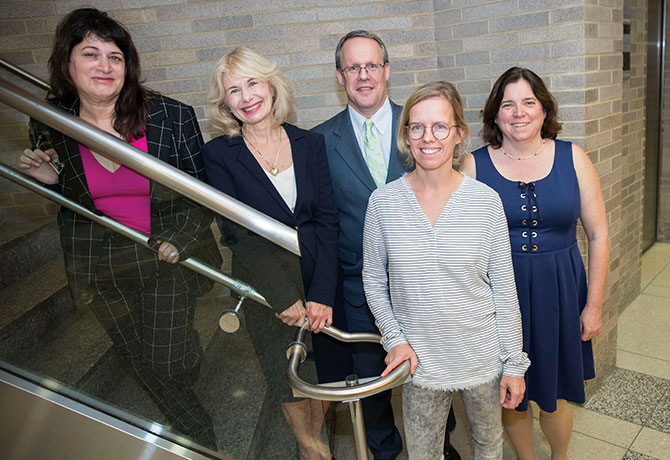
The recent recruitment of five specialists to the Department of Psychiatry at the Icahn School of Medicine at Mount Sinai has revitalized research, treatment, and prevention efforts in the field of psychotic illnesses and has led to the creation of the Critical Connections Program, which will help advance these endeavors. Critical Connections will incorporate the collaborative efforts of multiple specialties within the Mount Sinai Health System—including neuroimaging, psychophysiology, genetics, neural stem cells, immunology, and epidemiology—with the goal of using the latest technologies and developments to find personalized interventions and treatments for sychosis. Clinical sites across the Health System also will contribute to a shared biorepository of samples collected from people with these illnesses.
• Dolores Malaspina, MD, MSPH, MS, a leader in the field of psychosis, and Director of the new Critical Connections Program, says, “The most fundamental human quality is the ability to connect with others. Severe mental illness, particularly psychosis in schizophrenia, bipolar disorder, depression, and other conditions, disrupt this capacity and has an enormous impact on individuals, families, communities, and the general population.” The costs of social services, hospitals, courts, and prisons have an economic impact, as well. “In spite of significant scientific advances, we still know little about how to prevent and treat most psychotic illnesses. Breakthrough discoveries require innovative designs,” she adds. Resilience, genetic susceptibility, family characteristics, environmental exposures, and other factors that account for the influences of nature and nurture will be studied by the program’s researchers. Pivotal changes occur in the brain throughout young adulthood that can be directed toward recovery and resilience. Plans call for educational training of medical students, residents, and fellows to translate new findings into evidence-based treatments. The following renowned recruits to the Icahn School of Medicine will be working with Dr. Malaspina to create a robust center of psychosis at the Mount Sinai Health System:
• Cheryl Corcoran, MD, Senior Faculty, and Program Leader in Psychosis Risk at the Mount Sinai Health System, is launching the CUE (Coping with Unique Experiences) program, a clinical risk and resilience research program for teens and young adults who have unusual thoughts, perceptual disturbances, and suspiciousness, and a familial-risk program for young relatives of patients with psychosis. Dr. Corcoran is also partnering with experts in family health and adolescent medicine to implement early identification and intervention programs for at-risk youth in the community. Further, Dr. Corcoran, collaborates with basic and translational neuroscientists to study the pathophysiology underlying illness risk. Currently, her main focus is natural language processing in neuropsychiatric disorders. Working with computational neuroscientists, Dr. Corcoran has identified language features that predict psychosis onset in at-risk youths. This includes subtle decreases in semantic coherence and complexity of speech (such as using shorter sentences and eliminating the words “which” and “that”). Funding from the National Institute of Mental Health has enabled Dr. Corcoran to study the neural correlates of these language abnormalities in a larger international cohort and develop targets for preventive intervention.
• David Kimhy, PhD, Senior Faculty, Leader in New Interventions in Schizophrenia at the Icahn School of Medicine at Mount Sinai, and Director of the Experimental Psychopathology Laboratory. Dr. Kimhy will focus on the development of novel cognitive, affective, and physical interventions for individuals with schizophrenia and at-risk for psychosis. Over the past decade, Dr. Kimhy has pioneered the use of aerobic exercise training to improve neurocognition in people with schizophrenia. Work from his laboratory indicates that aerobic exercise training using active-play video games is effective in enhancing neurocognition, with improvements-linked upregulation of Brain-Derived Neurotrophic Factor (BDNF), a biomarker of neuroplasticity. Recent work in his lab has also focused on use of mHealth technologies (smartphone) to study psychotic symptoms and functioning. His current funding includes NIMH awards for a multisite, single-blind, randomized clinical trial examining the impact of aerobic exercise on neurocognition and biomarkers of neuroplasticity in individuals with schizophrenia, and a trial examining the use of mHealth technologies to optimize treatment for first episode psychosis. Continuing his longstanding commitment to training future researchers and clinicians, Dr. Kimhy also serves as the Director of Education at The Mental Illness Research, Education and Clinical Center at the James J. Peters VA Medical Center in the Bronx.
• Lotje de Witte, MD, PhD, Assistant Professor of Psychiatry, combines clinical work and scientific exploration in immunology in pursuit of treatments and interventions for psychiatric diseases. Her laboratory investigates the connection between the immune system and the pathogenesis of psychiatric disorders, such as schizophrenia, mood disorders, and autism. Recently, Dr. de Witte set up a novel stem-cell derived brain organoid model to study microglia, and established the methodology to isolate microglia from postmortem brain tissue. Microglia cells are part of the immune system and involved in both inflammation and reconstruction in the brain, processes thought to be involved in schizophrenia. After studying the cell biological mechanisms of HIV-1 transmission, Dr. de Witte used this experience to start a distinctive research line at the Brain Center Rudolf Magnus in Utrecht, the Netherlands. She received her MD and PhD at the VU University Medical Centre, Amsterdam. Her research has been published in Nature Medicine, the Journal of Clinical Investigation, PLOS Pathogens, and Proceedings of the National Academy of Sciences.
• Judith Weissman, PhD, JD, MPH, Assistant Professor of Psychiatry, and Population Health, serves as a Research Health Specialist at the James J. Peters VA Medical Center. Her expertise is in using national data sets to examine health care patterns in the mentally ill. At the VA Medical Center, she collaborates with other researchers to investigate the incidence and risk factors of suicide, along with the access and utilization of mental health care services among vulnerable populations, particularly military veterans with mental illness. Dr. Weissman will also research possible interventions. Suicide by veterans remains a critical problem, and few empirically based treatment strategies for suicide prevention among post-deployed military personnel currently exist. Serving as a Senior Service Fellow at the U.S. Centers for Disease Control and Prevention earlier in her career helped hone Dr. Weissman’s skill in analyzing large data sets. She has also investigated topics such as polypharmacy in the nation’s elderly and disparities in antidepressant prescribing practices.
Cancer Metastasis May Occur Before a Tumor Develops
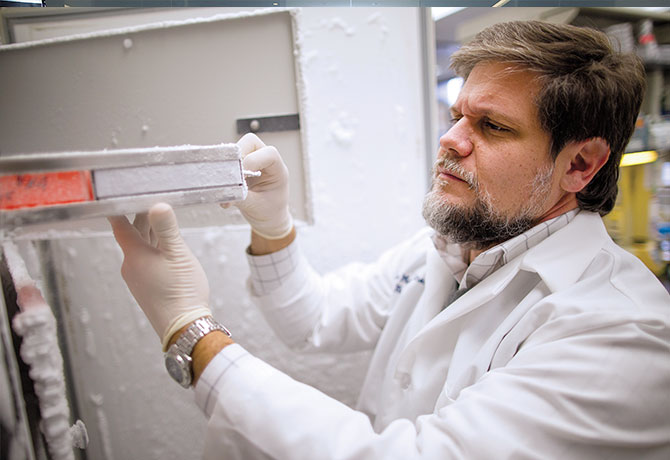
Normal immune cells called macrophages, which reside in healthy breast tissue surrounding milk ducts, play a major role in helping early breast cancer cells leave the breast for other parts of the body, potentially creating metastasis before a tumor has even developed, according to a study by researchers at the Icahn School of Medicine at Mount Sinai.
The macrophages help in mammary gland development by regulating how milk ducts branch out through breast tissue. Many studies have also proven the importance of macrophages in metastasis, but until now, only in models of advanced large tumors. By studying human samples, mouse tissues, and breast organoids, which are miniaturized and simplified versions of breast tissue produced in the lab, the researchers found that in very early cancer lesions, macrophages are attracted to enter the breast ducts where they trigger a chain reaction that brings early cancer cells out of the breast, according to the study published in the January 2, 2018, issue of Nature Communications.
This research shows that macrophages’ relationship with normal breast cells is co-opted by early cancer cells that activate the cancer-causing HER2 gene, helping in the newly discovered role of these immune cells.
“Our study challenges the dogma that early diagnosis and treatment mean a sure cure,” says lead researcher Julio Aguirre-Ghiso, PhD, Professor of Oncological Sciences, Otolaryngology, Medicine (Hematology and Medical Oncology), at The Tisch Cancer Institute at the Icahn School of Medicine at Mount Sinai. “In this study and in our previous studies, we present mechanisms governing early dissemination. This work further sheds light on the mysterious process of early dissemination and cancer of an unknown primary tumor.”
The findings from this study could eventually pinpoint biomarkers to identify cancer patients who may be at risk of carrying potential metastatic cells due to these macrophages, and potentially lead to the development of novel therapies that prevent early cancer metastasis.
New Grant Supports Clinical Trials in Immunotherapy
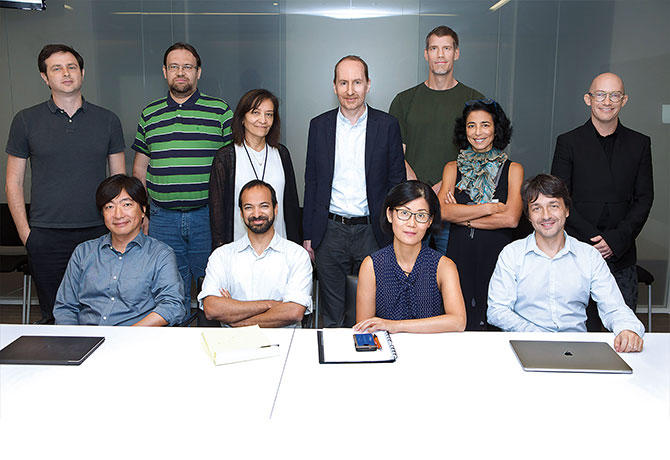
The Human Immune Monitoring Center (HIMC) at the Mount Sinai Health System has received an $8 million grant from the National Cancer Institute to analyze the effectiveness of new checkpoint inhibitors and adoptive T-cell therapies in adult and pediatric patients who are enrolled in National Institutes of Health–supported cancer immunotherapy trials.
Using CyTOF mass cytometry, seromics, microbiome sequencing, multiplex immunohistochemistry, and other methods, the HIMC has developed unique, high-dimensional approaches that query the mechanisms at work in the immune system when cancer therapies are introduced. These deep-analysis tools will help Mount Sinai’s researchers develop a clearer understanding of why new immunotherapy drugs benefit some patients but not others. Ultimately, this knowledge will be used to inform the design of immunotherapy strategies that will benefit greater numbers of patients.
“The success of novel immunotherapy drugs is changing decades of clinical practice, and for a handful of patients—20 to 30 percent—the responses have been extraordinary,” says Sacha Gnjatic, PhD, Co-Director of the HIMC and the grant’s Principal Investigator. “But determining why only a fraction of patients are deriving clinical benefit is at the forefront of our work.”
Validating useful biomarkers to help guide treatment will be a priority for the Mount Sinai team. “The immune-monitoring approaches funded by this grant will lead to a real paradigm shift in clinical trials,” says Miriam Merad, MD, PhD, Director of both the Human Immune Monitoring Center and the Precision Immunology Institute at The Tisch Cancer Institute. “Going forward, the clinical trials will be designed to attack each patient’s unique cancer,” based on his or her biomarkers.
Mount Sinai’s research team has 15 key investigators, including immunologists, technologists, pathologists, clinicians, and computational biologists who currently handle nearly 50 academia- and industry-sponsored clinical trials and studies per year. Under the terms of the grant, the Mount Sinai team will serve as an NIH Cancer Immune Monitoring and Analysis Center (CIMAC) along with three other leading U.S. institutions: the Dana-Farber Cancer Institute, the University of Texas MD Anderson Cancer Center, and Stanford Cancer Institute.
By sharing their data and developing a systematic and uniform approach to the clinical testing of biomarkers, the CIMAC researchers will gain a better understanding of the complicated mechanisms behind response and resistance to cancer therapy. Collaboration will enable the researchers to share data and move beyond their traditional silos in an effort to improve treatments.
The Mount Sinai team will measure the effects of new therapies on all immune correlates, including tissues, cells, proteins, and genes, and examine the influence of gut flora on a patient’s response to these therapies. The four CIMAC grants are part of the NIH’s new $210 million public-private research collaboration—the Partnership for Accelerating Cancer Therapies—to advance promising immunotherapy treatments, which is part of the National Cancer Institute’s Beau Biden Cancer Moonshot initiative.
Announced in 2016, by then President Barack Obama, the Moonshot initiative seeks to harness American innovation in the diagnosis, prevention, and treatment of cancer. Through the partnership, nine major pharmaceutical companies, including Bristol-Myers Squibb, Celgene, and Janssen Pharmaceuticals, Inc., each will contribute $1 million per year for five years.
A Possible Link Between Crohn’s and Parkinson’s Diseases
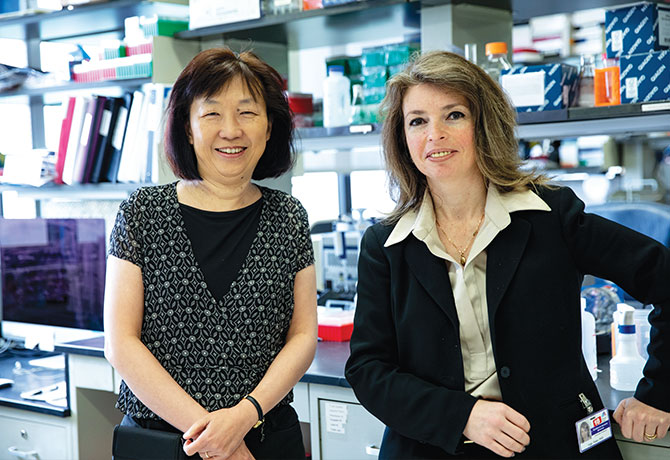
People of Ashkenazi Jewish descent with Crohn’s disease have a high likelihood of carrying the LRRK2 gene mutation, a major genetic cause of Parkinson’s disease, according to research at the Icahn School of Medicine at Mount Sinai. “Crohn’s disease is a complex disorder with multiple genes and environmental factors involved, which disproportionately affects individuals of Ashkenazi Jewish ancestry,” says lead researcher Inga Peter, PhD, Professor of Genetics and Genomic Sciences at the Icahn School of Medicine at Mount Sinai. “The presence of shared LRRK2 mutations in patients with Crohn’s disease and Parkinson’s disease provides refined insight into disease mechanisms and may have major implications for the treatment of these two seemingly unrelated diseases.”
In particular, the researchers identified a new functional risk variant, N2081D, which boosts LRRK2’s kinase activity, as well as a protective variant that inactivates LRRK2. Dr. Peter says LRRK2 inhibitors being developed for Parkinson’s disease might help people with Crohn’s disease, while anti-inflammatory approaches could benefit Parkinson’s patients. The study’s findings, published in the January 10, 2018, issue of Science Translational Medicine, could help doctors better understand Crohn’s disease, determine specifically who is at risk, and develop new drugs for treatment and/or prevention by targeting this specific gene. “Defining the biology of naturally occurring protective mutations is quite important because they define desired outcomes for potentially new therapies,” says the study’s co-author, Judy H. Cho, MD, Director of the Institute for Personalized Medicine at the Icahn School of Medicine.
Mount Sinai Spin-Off to Revolutionize Diagnostics
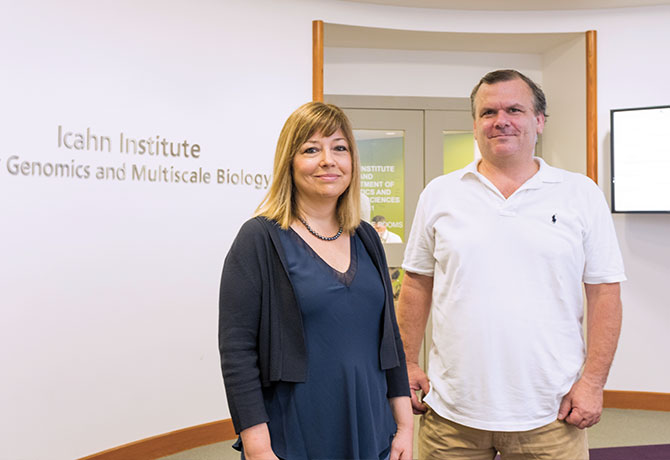
One year after being launched as a Mount Sinai Health System venture in June 2017, Sema4—a patient-centered predictive health company based in Stamford, Connecticut—continues to establish itself as a leader in diagnostic testing. Sema4, the first spinoff of its kind at Mount Sinai, is led by Eric Schadt, PhD, a pioneer in big data and systems biology, founding Director of the Icahn Institute for Genomics and Multiscale Biology, and Dean for Precision Medicine at the Icahn School of Medicine at Mount Sinai.
Mount Sinai’s significant investment in Sema4 reflects its commitment to genetic research, diagnostics, and next-generation treatments. Sema4’s leaders also include Lisa Edelmann, PhD, the long-time Executive Director of the Mount Sinai Genetic Testing Laboratory in New York City, who now serves as the company’s Chief Diagnostics Officer; and Todd Arnold, PhD, Chief Laboratory Operations Officer. The company has a staff of more than 450, including scientists, doctors, engineers, clinicians, and genetic counselors from the Icahn Institute and the Department of Genetics and Genomic Sciences.
“The creation of this company represents a major investment in genomics and the clinical sphere, which will allow Sema4 to grow as a commercial entity and bring to market more sophisticated tests for patients at Mount Sinai and around the country,” says Dr. Edelmann.
Sema4 currently offers a wide range of high-quality reproductive health genetic tests, including Sema4 Expanded Carrier Screen (ECS), CarrierCheck, and Sema4 Natalis, a supplemental newborn screen that can detect 193 genetic conditions and provide information on how a child is likely to respond to 38 medications commonly prescribed during childhood. The company is also in the process of launching two additional reproductive health tests: the new Sema4 Noninvasive Prenatal Select and an enhanced version of ECS.
With a growing portfolio of molecular oncology tests and services, including an array of hereditary cancer tests, Sema4 is now also applying its expertise to cancer. A new next-generation sequencing-based panel, to be launched in June 2018, will analyze key cancer genes to help doctors personalize cancer therapy and identify clinical trials that may benefit their patients.
In addition to its diagnostics capabilities, Sema4 uses data gathered during genetic testing to further translational research. Using patient data for this purpose requires consent, the acquisition of which can be a complex process. To create a seamless experience, Sema4 has developed a new electronic e-consent system.
The more data Sema4 collects through its tests, the more information it will have to develop better insights, computer models, and predictions that can be used to help transform the way diseases are diagnosed, treated, and prevented, says Dr. Schadt.
“We would like to create larger sets of data about patients that they and their doctors can analyze to make the best health care decisions,” Dr. Schadt says. “Our bet is that medicine will become much more of an information science, and providers who can master the information and base meaningful decisions on that data will be able to better serve their patients.”
Study Reveals Direct Link Between Surgeon Experience and Outcomes for Mitral Valve Operations
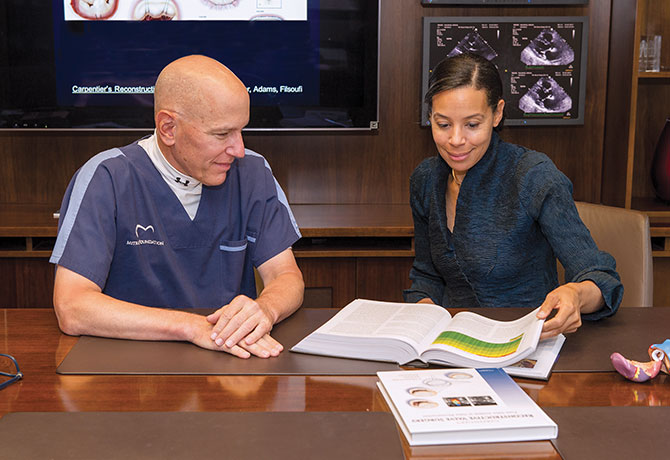
Researchers at the Icahn School of Medicine at Mount Sinai have found that patients who undergo mitral valve operations with surgeons who perform more than 25 such procedures annually experience lower one-year mortality and reoperation rates when compared to individuals treated by surgeons who do fewer procedures. Significantly, those high-volume surgeons also were more likely to perform a valve repair—the preferred treatment that offers important clinical advantages, such as better life expectancy and quality of life—over a valve replacement with a mechanical or animal valve.
The findings were presented at the American Association for Thoracic Surgery Centennial meeting and simultaneously published online by the Journal of the American College of Cardiology. In a normal heart, mitral valve leaflets open and close with each heartbeat to allow blood to flow in one direction from the upper collection chamber to the lower pumping chamber. In degenerative mitral valve disease, one or both leaflets prolapse, leading to the backward flow of blood (mitral valve regurgitation).
In the study, Mount Sinai researchers analyzed adult patients who underwent mitral valve surgery in New York State between 2002 and 2013—a population that included a cohort of 5,475 patients with degenerative disease—comparing repair rates, reoperations within 12 months of repair, and survival, based on total annual surgeon volume. In all, 313 surgeons from 41 institutions met the study’s criteria. The findings showed that among surgeons who performed any mitral valve procedures, the median volume was 10 cases per year, with a mean valve repair rate of 55 percent. In the subgroup of patients with degenerative disease, the mean repair rate ranged from 77 percent for surgeons with total annual volumes of more than 51 cases, to 48 percent for surgeons who performed fewer than 10 cases.
Other key results showed that surgeons who performed 25 or more surgeries annually had reoperation rates at 1.3 percent compared to 3.6 percent for surgeons doing fewer surgeries. Additionally, survival improved for every 10 additional cases. “Our findings add further clarity to the American Heart Association and American College of Cardiology guidelines that already recognize that patients with degenerative mitral valve disease should be referred to experienced mitral surgeons whenever feasible,” says the study’s senior author, David H. Adams, MD, Cardiac Surgeon-in-Chief of the Mount Sinai Health System, and the Marie-Josée and Henry R. Kravis Professor and Chair of the Department of Cardiovascular Surgery at the Icahn School of Medicine at Mount Sinai. “This is the first study to link individual surgeon volume to survival and freedom from reoperation at one year in patients undergoing operations for degenerative mitral valve disease.”
The study’s lead author, Joanna Chikwe, MD, Clinical Professor of Cardiovascular Surgery at the Icahn School of Medicine at Mount Sinai, and Professor of Surgery, Chief of Cardiothoracic Surgery, and Co-Director of the Heart Institute at Stony Brook School of Medicine, notes, “Considering that there was an incremental improvement in survival and probability of repair with increasing volume over 25 operations, one could make the argument that a minimum volume target of 50, or even more, annual operations would be optimal and particularly beneficial in patients with complex but repairable mitral valve disease.”
Nature Publication Names Mount Sinai Among Most Innovative in Research
The Icahn School of Medicine at Mount Sinai is among the top 10 research institutions in the world based on its contributions to published research that is later cited by other organizations in patent development.
The rankings, created by the Nature Index 2017 Innovation supplement, used a unique set of metrics to shed light on the impact academic research is having on innovation and determine key academic players whose ideas may shape tomorrow’s inventions.
According to the Nature Index, the top rankings reflect institutions with global reputations for high-quality research and others whose published work is having a disproportionately high impact relative to their size. The index was compiled by Nature Research, a unit of the company that publishes the journal Nature.
Recent Appointments
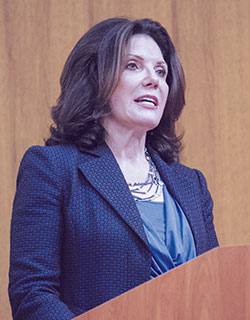
Andrea E. Dunaif, MD, a renowned physician-scientist in diabetes and women’s health, has joined the Mount Sinai Health System as Chief of the Hilda and J. Lester Gabrilove Division of Endocrinology, Diabetes and Bone Disease. Dr. Dunaif is a leader in research into polycystic ovary syndrome (PCOS), which affects about 7 percent of reproductive-age women. PCOS is an inherited disorder where the ovaries, and, frequently, the adrenal glands, make a slight increase in the male hormone testosterone. In a continuation of her work, funded by a $2.5 million National Institutes of Health (NIH) grant, Dr. Dunaif is mapping chromosomal regions that have a high likelihood of containing genes causing PCOS. The ultimate goal is to identify therapeutic targets and genetic markers that could be used to predict and prevent PCOS.
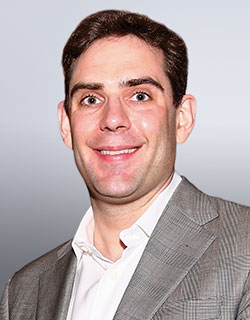
Adam Margolin, PhD, recently was appointed Chair and Professor of the Department of Genetics and Genomic Sciences, Director of the Icahn Institute for Genomics and Multiscale Biology, and Senior Associate Dean for Precision Medicine at the Icahn School of Medicine at Mount Sinai (ISMMS). Dr. Margolin is a leader in developing machine learning algorithms to analyze large-scale molecular datasets to predict therapies specific for an individual patient, and to infer the key cellular processes that underlie cancer drug susceptibility and other clinically relevant phenotypes. He will oversee a vibrant enterprise ranked fourth among medical schools in National Institutes of Health funding for genetics research.
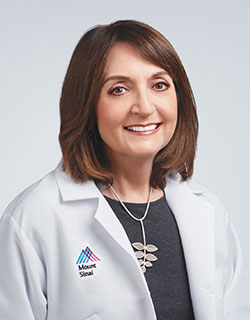
Helen S. Mayberg, MD, a neurologist known for her study of brain circuits in depression and for her pioneering research in deep brain stimulation—which led to one of the first hypothesis-driven treatment strategies for a major mental illness—has been appointed founding Director of the Center for Advanced Circuit Therapeutics at the Icahn School of Medicine at Mount Sinai. She has also been named Mount Sinai Professor in Neurotherapeutics, with senior faculty appointments in Neurology, Neurosurgery, Psychiatry, and Neuroscience. Under Dr. Mayberg’s direction, the Center will build a platform for collaborative translational research that will bring together clinical colleagues in neurology, neurosurgery, and psychiatry with experts from neuroscience, imaging, engineering, bioinformatics, neuroengineering, and computational neuroscience. The goal is to strengthen Mount Sinai’s global role in devising novel transformational treatments for depression and other neuropsychiatric disorders, as well as to refine and optimize current neuromodulation strategies for movement disorders and epilepsy now routinely practiced.
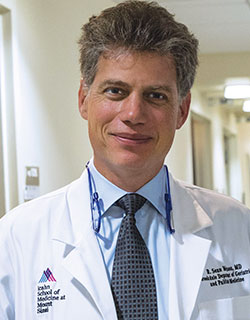
R. Sean Morrison, MD, has been appointed Ellen and Howard C. Katz Chair of the Brookdale Department of Geriatrics and Palliative Medicine at Icahn School of Medicine at Mount Sinai. Dr. Morrison joined Mount Sinai in 1995 and helped found Mount Sinai’s palliative care program. He plans to build upon the success of his predecessor, Albert Siu, MD, who was Chair for 15 years, and helped create the nation’s first Department of Geriatrics. Dr. Morrison’s goals for the Department include developing new models of clinical care to match the needs of an aging population; creating the science and evidence base that supports the care; and training a workforce that is well prepared to care for older adults and those with serious illness. As baby boomers continue to age, he says, health professionals will need to have the core knowledge and skills of geriatrics and palliative care in order to deliver high-value health care.
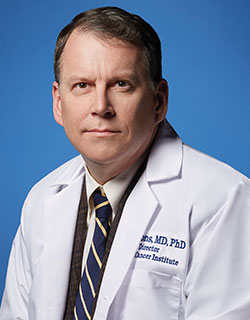
Ramon Parsons, MD, PhD, was appointed Director of the Tisch Cancer Institute in 2017. Since then, he has been elected to the National Academy of Medicine and has received a $6.7 million award from the National Cancer Institute. The award will fund research into the tumor-suppressing functions of the PTEN gene—which encodes a phosphatase enzyme relevant to many types of cancer—that he discovered 20 years ago as a fellow at Johns Hopkins School of Medicine. As Director, Dr. Parsons plans to detect hypermutating cancers as early as possible in a patient’s diagnosis so that immune checkpoint therapy can begin at the most advantageous point during treatment. He also plans to enhance the infrastructure for translational research and promote research that addresses disparities in patient outcomes.
Mount Sinai Sends Relief Missions to Puerto Rico
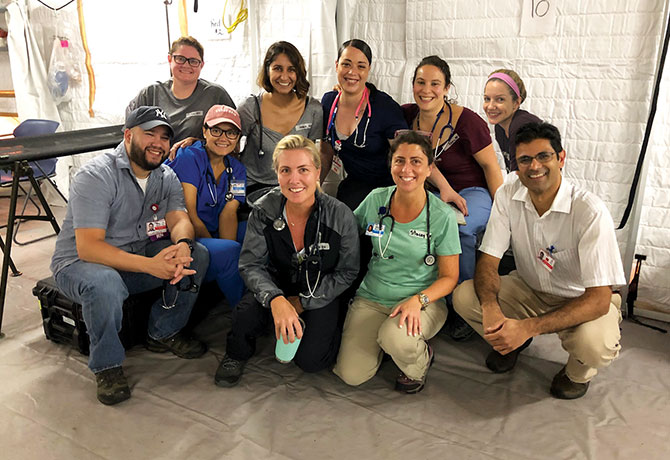
Conditions in Puerto Rico were austere after Hurricane Maria made landfall on Wednesday, September 20, 2017, pushing 155 mph winds across the island with the same force as a thunderous tornado 50 to 60 miles wide and leaving utter devastation to the infrastructure, power grid, and water supply.
Sixteen-hundred miles away in New York City, concerned faculty and staff throughout the Mount Sinai Health System—some with ties to Puerto Rico, but many without—were eager to help their fellow Americans. And, by early October, three physicians and seven nurses were selected to participate in the first of two medical relief missions to Fajardo, Puerto Rico. A second team of 10 volunteers would follow them in late October.
The missions—staffed by individuals representing all hospitals across the Health System—were part of a massive effort involving the Governor’s Office, the New York State Department of Health, the U.S. Department of Health and Human Services, the Greater New York Hospital Association, the Healthcare Association of New York State, the New York State Nurses Association, and 1199 SEIU.

Stacey A. Conklin, MSN, MS, RN, Vice President for Patient Care Services, New York Eye and Ear Infirmary of Mount Sinai, led Mount Sinai’s first team. Under large white tents—which were set up and supplied by the National Disaster Medical System in a lot adjacent to a functioning private hospital and staffed with other providers from Disaster Medical Assistance Teams—the volunteers helped manage a clinic and a triage area for walk-in patients.
“The need was great and the team was superb,” recalls Ms. Conklin. “We worked together seamlessly and tirelessly for long hours and without any days off, sometimes seeing close to 200 patients a day. Every team member was extremely grateful for the opportunity to serve the community of Fajardo.”
Ultimately, Team One helped treat 1,636 patients during their time there, with few comforts themselves—eating prepackaged meals, sleeping in barracks-style cots, and using outdoor portable toilets and sinks. The camp, as it was called, was able to provide routine primary care, cardiac monitoring and oxygen for more urgent patient needs, and pediatric and women’s health services, and was equipped with an isolation area. While hundreds of cases involved common injuries and illnesses, minor trauma, and infections, the team also saw many potentially serious cases that occurred when patients were unable to manage chronic conditions.
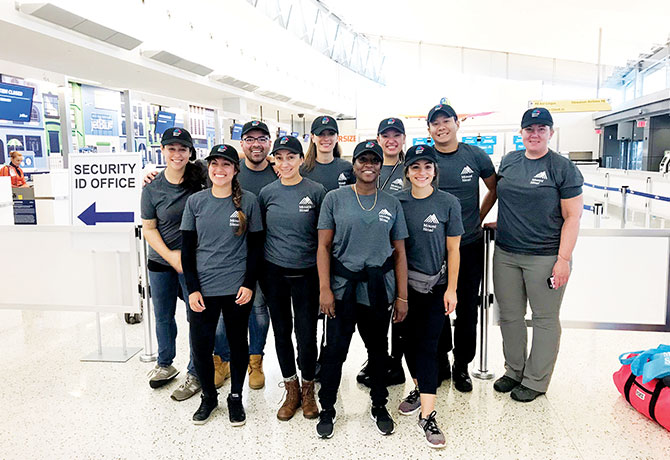
The second Mount Sinai team of three doctors, two nurse practitioners, and five nurses, led by Trina Cosme, BSN, RN, Assistant Nurse Manager, Labor and Delivery at Mount Sinai West, arrived in Fajardo on Tuesday, October 24, and after an intensive day of training they assumed the duties of Team One, treating nearly 2,000 patients.
Ms. Cosme recalls a visit by Eric D. Hargan, Deputy Secretary of Health and Human Services, and Robert Kadlec, MD, Assistant Secretary for Preparedness and Response, both showing support for every volunteer assisting in the effort, including a group of young Puerto Rican high school and college students—aspiring nurses and doctors—who helped the Mount Sinai staff. “We were embraced by the community,” says Ms. Cosme.